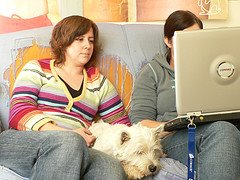Tuesday, October 31, 2006
Web surfing in public places: Is this Secure and Safe
 A businessman who has logged on to a wireless network at the airport, printed a document at a hotel business centre or checked email messages at a public terminal has probably wondered, at least fleetingly, “Is this Secure and Safe"
A businessman who has logged on to a wireless network at the airport, printed a document at a hotel business centre or checked email messages at a public terminal has probably wondered, at least fleetingly, “Is this Secure and Safe"“If you go into the average hotel and sit down in the business centre and have a look at their computer, I’m sure you’ll find some interesting things that people shouldn’t have left behind, The first step companies need to do is to educate people about how valuable the data is and also how small the circles are in which they travel, noting how loudly many people discuss business on cellphones, without a thought for who may be nearby or what may be in the air. Wireless networks at airports—or for that matter, hotels or cafes—are not as secure as most people think. Someone may have some software on their computer that allows them to look at all the wireless transactions going on around them and capture packets that are floating between the laptop and the wireless access point.
These software programs are called packet sniffers and many can be downloaded free online. They are typically set up to capture passwords, credit card numbers and bank account information. Shopping on the web is not a great way to kill time during a flight delay. Where I’d draw the line is putting in your bank account information or credit card number and checking e-mail messages probably is not that risky, but if you want to be cautious, change your password once you are on a secure connection again.
While it is hard to say how likely it is that someone is lurking on a public network, many public networks do not have adequate security. Last fall, InfoWorld magazine published an article about a security researcher who managed to collect more than 100 passwords, per stay, at hotels with lax security.
Using a public computer can also mean courting trouble, because data viewed while surfing the web, printing a document or opening an e-mail attachment is generally stored on the computer—meaning it could be accessible to the next person who sits down. Its better practising that remove traces of your work, delete any documents you have viewed, clear the browser cache and the history file and empty the trash before you walk away.
There are also simple measures you can take to protect your hardware, like using a cable lock to secure your laptop in a hotel room or even a cafe and making sure you lock your computer bag in the trunk rather than leaving it on the back seat.
